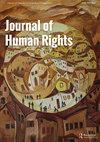Global perceptions of South Korea's COVID-19 policy responses: Topic modeling with tweets
IF 1.6
2区 社会学
Q3 INTERNATIONAL RELATIONS
引用次数: 7
Abstract
Abstract This article focuses on South Korea as a case, analyzes a collection of 87,487 tweets referencing both COVID-19 and South Korea during the period of the pandemic, and examines global users’ understandings and/or assessments of South Korean responses to the health crisis. This article uses Pseudo-document-based Topic Model (PTM) as an advanced machine learning technique for classifying short texts into viable topics or themes. In the PTM results, human rights-related topics received much less attention than other topics on government responses, health measures, vaccines, and economic issues. Furthermore, discussions on surveillance, restrictions on assembly, and stigmatization of religious groups tended to emerge rather briefly and soon subsided. Rights protection in the South Korean context appeared at odds with the larger target of protecting public health and the safety of society. The analyses demonstrate a tradeoff between implementing public health imperatives and respecting human rights in South Korea.全球对韩国新冠肺炎政策应对的看法:推特主题建模
本文以韩国为例,分析了大流行期间87487条涉及COVID-19和韩国的推文,并考察了全球用户对韩国应对卫生危机的理解和/或评估。本文使用基于伪文档的主题模型(Pseudo-document-based Topic Model, PTM)作为一种高级机器学习技术,用于将短文本分类为可行的主题或主题。在PTM结果中,与人权有关的主题受到的关注远远少于与政府反应、卫生措施、疫苗和经济问题有关的其他主题。此外,关于监视、限制集会和侮辱宗教团体的讨论往往出现得相当短暂,很快就平息了。韩国背景下的权利保护似乎与保护公共健康和社会安全的更大目标不一致。这些分析表明,在韩国实施公共卫生要求与尊重人权之间存在权衡。
本文章由计算机程序翻译,如有差异,请以英文原文为准。
求助全文
约1分钟内获得全文
求助全文

 求助内容:
求助内容: 应助结果提醒方式:
应助结果提醒方式:


